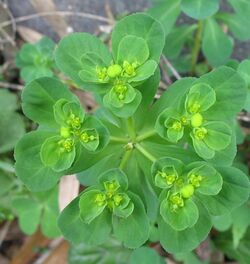Biology:Euphorbia helioscopia
| Euphorbia helioscopia | |
|---|---|

| |
| Flowers and immature fruit | |
| Scientific classification | |
| Kingdom: | Plantae |
| Clade: | Tracheophytes |
| Clade: | Angiosperms |
| Clade: | Eudicots |
| Clade: | Rosids |
| Order: | Malpighiales |
| Family: | Euphorbiaceae |
| Genus: | Euphorbia |
| Species: | E. helioscopia
|
| Binomial name | |
| Euphorbia helioscopia | |
Euphorbia helioscopia, the sun spurge or madwoman's milk, is a species of flowering plant in the spurge family Euphorbiaceae. It is a herbaceous annual plant, native to most of Europe, northern Africa, and eastward through most of Asia.[1][2][3]
Additional folk names include wart spurge, summer spurge, umbrella milkweed, and wolf's-milk. [4][5]
Description
It is an annual plant growing in arable land and disturbed ground. It grows to 10–50 cm tall, with a single, erect, hairless stem, branching toward the top. The leaves are oval, broadest near the tip, 1.5–3 cm long, with a finely toothed margin. The flowers are small, yellow-green, with two to five basal bracts similar to the leaves but yellower; flowering lasts from mid-spring to late summer.[3][4]
Similar species include Euphorbia rhabdotosperma, having the appearance of E. helioscopia with smaller parts and differing seed surface [6] (Iran, North Caucasus, Transcaucasus, Turkey, Turkmenistan).
Uses
It is highly poisonous. Active ingredients are extracted from it for use in pharmaceutical industry. It is also a plant used in Chinese traditional medicine.[7] Its extract has been found to inhibit hepatocellular carcinoma in vivo in mice[8] and in vitro in human cells.[citation needed]
Chemistry
Euphorbia helioscopia contains the jatrophone-type diterpenoids euphoheliosnoid A, B, C[9] and D[7] and other toxic diterpenes such as euphoscopins, epieuphoscopins euphornins, cuphohelioscopins and euphohelionone.[10]
Four esters of 12-deoxyphorbol (12-deoxyphorbol-13-phenylacetale-20-acetate, 12-deoxyphorbol-13-dodec-dienoate-20-acetate, 12-deoxyphorbol-13-[2-methyl-cis-2-butenoate]-20-acetate and 12-deoxyphorbol-13-[2-methyl-cis-2-butenoate]) can be isolated from the fresh aerial parts. These substances are the major skin irritants found in the plant.[11]
m-Hydroxyphenylglycine and 3,5-dihydroxyphenylglycine are two amino acids that can be isolated from the latex of E. helioscopia.[12]
Hydrolysable tannins can be found in E. helioscopia. Helioscopinin A (1,6-(S)-hexahydroxydiphenoyl-2,4-(S)-dehydrohexahydroxydiphenoyl-3-O-galloyl-β-D-glucose), helioscopinin B (1,6-(S)-hexahydroxydiphenoyl-3-O-galloyl-β-D-glucose), helioscopin A (1,6-(S)-hexahydroxydiphenoyl-2,4-(R)-elaeocarpusinoyl-3-O-galloyl-β-D-glucose) and helioscopin B (1,3,6-tri-O-galloyl-2,4-(R)-elaeocarpusinoyl-β-D-glucose) can be found together with eight other tannins: corilagin, punicafolin, geraniin, elaeocarpusin, furosin, terchebin, mallotusinin and carpinusin.[13] Helioscopinin-A shows anti-allergic and anti-asthmatic activities in guinea pigs. It is suggested that this compound exerts its activities through antagonism on leukotriene D4-induced responses.[14]
References
- ↑ {{citation | mode = cs1 | title = Euphorbia helioscopia | work = Germplasm Resources Information Network (GRIN) | url = | publisher = [[Organization:Agricultural Research ServAgricultural Research Service (ARS), United States Department of Agriculture (USDA) | access-date = 14 January 2018 }}
- ↑ Flora Europaea: Euphorbia helioscopia
- ↑ 3.0 3.1 Blamey, M. & Grey-Wilson, C. (1989). Flora of Britain and Northern Europe. ISBN:0-340-40170-2
- ↑ 4.0 4.1 Malta Wild Plants Euphorbia helioscopia
- ↑ "Euphorbia helioscopia". Species. GBIF. http://www.gbif.org/species/3066367.
- ↑ Davis. Flora of Turkey and the East Aegean Islands, vol. 7.
- ↑ 7.0 7.1 Zhang, Wen; Guo, Yue-Wei (2006). "Chemical Studies on the Constituents of the Chinese Medicinal Herb Euphorbia helioscopia L". Chemical & Pharmaceutical Bulletin 54 (7): 1037–9. doi:10.1248/cpb.54.1037. PMID 16819227.
- ↑ "Hepatocellular Carcinoma Growth Is Inhibited by Euphorbia helioscopia L. Extract in Nude Mice Xenografts". Biomed Res Int 2015: 1–9. 2015. doi:10.1155/2015/601015. PMID 26090427.
- ↑ Zhang, Wen; Guo, Yue-Wei (2005). "Three New Jatrophone-Type Diterpenoids fromEuphorbia helioscopia". Planta Medica 71 (3): 283–6. doi:10.1055/s-2005-837832. PMID 15770554.
- ↑ Yamamura, Shosuke; Shizuri, Yoshikazu; Kosemura, Seiji; Ohtsuka, Jiro; Tayama, Takao; Ohba, Shigeru; Ito, Masatoki; Saito, Yoshihiko et al. (1989). "Diterpenes from Euphorbia helioscopia". Phytochemistry 28 (12): 3421. doi:10.1016/0031-9422(89)80360-7. Bibcode: 1989PChem..28.3421Y.
- ↑ Schmidt, Richard J.; Evans, Fred J. (1980). "Skin irritants of the sun spurge (Euphorbia helioscopia L)". Contact Dermatitis 6 (3): 204–10. doi:10.1111/j.1600-0536.1980.tb05599.x. PMID 7389328.
- ↑ Müller, P; Schütte, HR (1968). "M-Hydroxyphenylglycine and 3,5-dihydroxyphenylglycine, 2 new amino acids from the latex of Euphorbia helioscopia L" (in German). Zeitschrift für Naturforschung B 23 (5): 659–63. doi:10.1515/znb-1968-0516. PMID 4385921.
- ↑ Lee, Seung-Ho; Tanaka, Takashi; Nonaka, Gen-Ichiro; Nishioka, Itsuo (1990). "Tannins and related compounds. XCV. Isolation and characterization of helioscopinins and helioscopins, four new hydrolyzable tannins from Euphorbia helioscopia L. (1)". Chemical & Pharmaceutical Bulletin 38 (6): 1518. doi:10.1248/cpb.38.1518.
- ↑ Park Kwan Ha; Koh Dongsoo; Lee Seungho; Jung Illmin; Kyung Hyun Kim; Lee Chul-Hoon; Kim Kye-Hoon; Lim Yoongho (2001). "Anti-allergic and anti-asthmatic activity of helioscopinin-A, a polyphenol compound, isolated from Euphorbia helioscopia". Journal of Microbiology and Biotechnology 11 (1): 138–142. INIST:995613.
| Wikimedia Commons has media related to Euphorbia helioscopia. |
Wikidata ☰ Q148889 entry
 |
